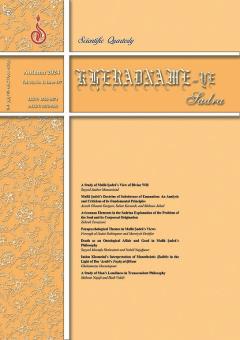Death as an Ontological Affair and Good in Mullā Ṣadrā’s Philosophy
Subject Areas : Studies on Mulla Sadra and the Transcendent Philosophy
Seyyed Mostafa Shahraieni
1
![]() ,
Nahid Najafpoor
2
,
Nahid Najafpoor
2
1 - Professor at the Institute for Humanities and Cultural Studies, Tehran, Iran
2 - PhD candidate of Kalam, University of Tabriz, Tabriz, Iran
Keywords: Death, voluntary death, natural death, untimely death, noblest order, good, divine wisdom,
Abstract :
Death as one of the most important problems of human beings has always attracted the attention of thinkers. Mullā Ṣadrā has dealt with this problem in most of his works. He divides death into two voluntary and involuntary types. The experience of voluntary death is possible for some divine saints who attain a station whereby, through the purification of the soul, they develop the ability to part from their bodies and travel to the higher worlds. The second type is the same natural death. Mull Sadra views death as an ontological affair, and since being good is essential to each and every ontological affair, he maintains that any kind of death, whether natural or untimely, is a natural and good event. Given the fact that untimely or sudden death occurs because of disease or accidents and apparently seems bad, how could one explain the goodness of death in its general sense? Another question is: What is the role of purgatorial development in this process? This paper is intended to respond to these questions based on Mullā Ṣadrā’s philosophical thoughts.
آشتیانی، سیدجلالالدین (1381) شرح بر زاد المسافر، قم: بوستان کتاب.
ابنسینا (1362) رسائل، قم: بیدار.
حسنزاده آملی، حسن (بیتا) هزار و یک نکته، تهران: نشر ناب.
سبحانی، جعفر، (1413ق) الهیات علی هدی الکتاب و السنة و العقل، تهران: مؤسسة امام صادق(ع).
شهگلی، احمد (1391) «علت مرگ از دیدگاه ابن سینا و ملاصدرا» آینه معرفت، دورۀ 12، شمارۀ 2، ص117ـ95.
عامری، معصومه؛ توازیانی، زهره (1394) «مبانی و راهحلهای ملاصدرا در مسئله شر»، حکمت صدرایی، شمارة 6، ص100ـ85.
عبودیت عبدالرسول (1389) خطوط کلی حکمت متعالیه، تهران: سمت.
ملاصدرا (1378) المظاهر الالهیة فی اسرار العلوم الکمالیة، تصحیح و تحقیق آیتالله سیدمحمد خامنه¬ای، تهران: بنیاد حکمت اسلامی صدرا.
ملاصدرا (1380) اسرار الایات و انوار البینات، ترجمة محمد خواجوی، تهران: پژوهشگاه علوم انسانی و مطالعات فرهنگی.
ملاصدرا (1381الف) رساله سه اصل، تصحیح و تحقیق سیدحسین نصر، تهران: بنیاد حکمت اسلامی صدرا.
ملاصدرا (1381ب) المبدأ و المعاد، تصحیح و تحقیق محمد ذبیحی و جعفر شاهنظری، تهران: بنیاد حکمت اسلامی صدرا.
ملاصدرا (1382) الحكمة المتعالية فی الأسفار الأربعة، ج9، تصحیح و تحقیق رضا اکبریان، تهران: بنیاد حکمت اسلامی صدرا.
ملاصدرا (1383الف) الحكمة المتعالية فی الأسفار الأربعة، ج1، تصحیح و تحقیق غلامرضا اعوانی، تهران: بنیاد حکمت اسلامی صدرا.
ملاصدرا (1383ب) الحكمة المتعالية فی الأسفار الأربعة، ج3، تصحیح و تحقیق مقصود محمدی، تهران: بنیاد حکمت اسلامی صدرا.
ملاصدرا (1383ج) الحكمة المتعالية فی الأسفار الأربعة، ج8، تصحیح و تحقیق علیاکبر رشاد، تهران: بنیاد حکمت اسلامی صدرا.
ملاصدرا (1383د) الشواهد الربوبیة فی المناهج السلوکیة، ترجمه و تفسیر جواد مصلح، تهران: سروش.
ملاصدرا (1384) شرح اصول کافی، تهران: بنیاد حکمت اسلامی صدرا.
ملاصدرا (1387) مفاتیح الغیب، ترجمة محمد خواجوی، تهران: مولی.
نورمحمدی، یحیی؛ عبودیت، عبدالرسول (1396 ) «تبین تکامل برزخی بر اساس مبانی فلسفی صدرالمتألهین»، معرفت کلامی، شمارة 19، ص74ـ61.
Skirry, J. (2005). Descartes and Metaphysics of Human Nature. London: Continuum.


